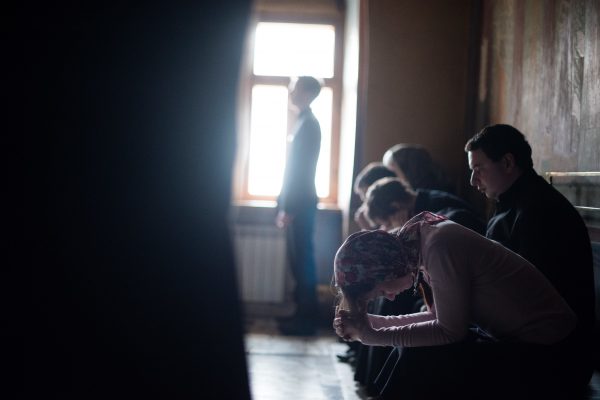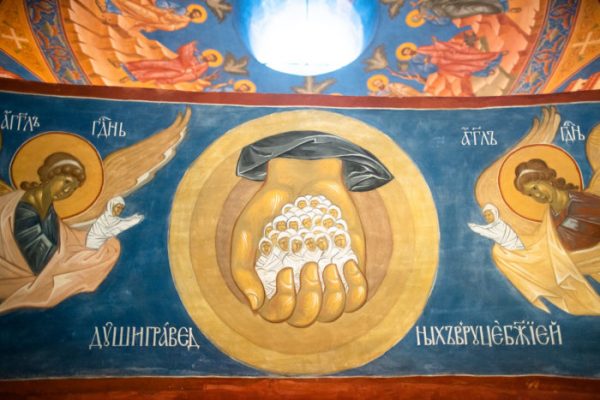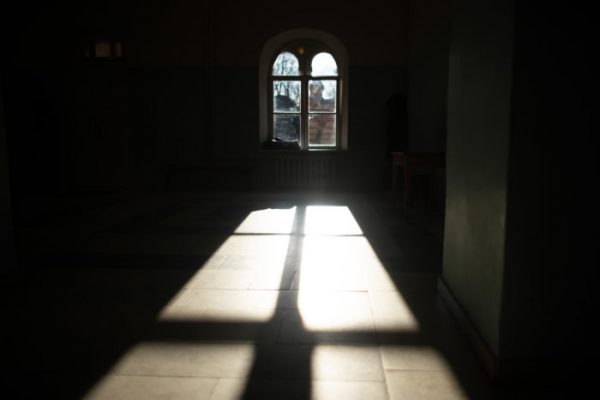
Archpriest Igor Fomin
Archpriest Igor Fomin, Rector of the Church dedicated to the Holy Blessed Prince Alexander Nevsky at MGIMO, describes the most common myths and fears associated with confession.
Myth. The priest is not needed for confession: God already knows that I repent.
You are right, God really sees all our sins and knows that you repent. You are also right that the role of the priest is secondary. But still it is very important.
Remember how in childhood, when we did something wrong, we wanted so much for our parents to forgive us as soon as possible. It turns out that it is not enough for us to repent, it is more important to receive forgiveness, that is, to understand that God loves, accepts and forgives you. This is what the priest testifies about when he covers you with a stole and reads a prayer of absolution. That is how we get proof that forgiveness is received.
You may ask why you cannot tell about your sin, for example, to your father or a friend, but only to a priest? A priest is someone who is established by the Church. Christ gave the power to give absolution to His first disciples, the Apostles, and the Apostles handed over this power to their disciples through ordination. And every priest of the Orthodox Church is a person who has received the “authority” to hear confession and give absolution from Christ Himself.
You can compare the “procedure” of confession with the judicial process, as many people imagine: it would probably be very difficult for you to prove your innocence only in front of a judge and a prosecutor, without witnesses and lawyers. And the priest is the witness that you repented.
Of course, repentance can occur anywhere — in a bus, at the service, or in the theater. And the Sacrament of Confession is only a statement of your repentance. You may have shed tears of repentance earlier, but at a confession you proved that you hate your sin so much that you want to get rid of it, bring it out of the depths of your heart to the light.
The role of the priest is also important as a spiritual guide. If you confess all the time to the same priest, he already knows you and your life, he can advise, teach you how to deal with the overcoming sin.

mpda
Fear. I’m afraid the priest will condemn me and chase me away
This fear is groundless: the priest will not condemn you, but will sincerely rejoice in the fact that you confessed. A person who goes to confession has already condemned themselves: that is, they hated the sin which they wanted to repent.
Therefore, there should not be any fear of the priest. You need to be afraid of something else: to have no time to confess your sin, to offend God, to distance yourself from Him.
The priest can “scold”, but rather, give instruction only to someone whom he has long been familiar with and who will definitely accept criticism constructively. I do not take responsibility from those who might have not understood you and could have been rude. But we should also remember that in any conflict there is blame on both sides. Some people try to adapt the Church to themselves, so they are unhappy with everything. And sometimes it happens that all the words of the priest are met with hostility, because they fall into the most sensitive place: the soul, and the person gets hurt.
Myth. There is no indication in the Bible that one should confess.
Confess your faults one to another, and pray one for another, that ye may be healed (James 5:16) – the Apostles mentioned this. The Savior Himself says in the Gospel: Whose soever sins ye remit, they are remitted unto them; and whose soever sins ye retain, they are retained (Jn 20:23).

mpda
Fear. I’m afraid to humiliate myself before a priest
I want to reassure you: a priest who has received confession for at least five years would not be surprised by any sin, no matter how sad it may sound. Fear of being humiliated arises from unwillingness to step over their own pride, but confession is not humiliation. On the contrary, when we are cleansed of sins, we become closer to God.
Though I often come across the fact that people keep something back, trying to hide a sin. I can’t understand that at all.
Project this situation on the relationship between parents and children. The parents know everything about the actions of a small child. When a child did something wrong, ate a jar of jam and did not admit it, lied, the parents have two ways to communicate with him or her. The first one is completely unacceptable: to “knock out” the truth – to give beans, threaten with a belt. But only mean parents do this – God does not have such methods. The aim of a normal parent is to lead the child to the realization of his or her guilt. The goal is not to catch the child lying, but to make him or her want to tell the truth and ask for forgiveness. Then the parent will be happy: the child has chosen the right, honest way.
In the same way we are in the palm of God’s hand. It is very important for Him that the man himself comes, repents and, as in childhood, says: “Dad, I am a fool, forgive me, I will not do this again.” Can He “give beans” to us and make us change? Of course He can. But He does not do this, although we would become good more quickly. But He does not do this, because initially He gave us free will.
Formally, you can wriggle, call your sin as you wish, but imagine that you look at yourself with the eyes of God and see it. Will it be repentance? No. Every penitent knows that after having boggled at a confession, you do not receive inner satisfaction. But since you do not have it, how can God have it? Try to be honest with yourself, think about what is more important – your “image” or eternal life? Everyone is faced with such a choice.
But there is no recipe that would make repentance real. Conscience will always tell you what to do.
Myth. I am ashamed to write sins on pieces of paper
The papers at confession are not a formalism, but a cheat sheet. And this is the only case where the cheat sheet is allowed and welcomed if it helps a person to cope with anxiety. It’s really scary to come and repent. Legs tremble, the voice weakens: it is really easy to forget everything. But since a person wrote sins on a piece of paper, it means that they are ready to pronounce them.
Many people prepare for this sacrament on a daily basis – write down their sins on a piece of paper at the end of the day, and then come to confession with them so as not to miss anything.
But sometimes it is very difficult for people to open up, to start talking about a hidden thing to a priest – and this is what the “cheat sheet” helps them with: they read the sins for which they have chosen the words in advance.
Although, we should remember that God always stands near our heart and knocks on it. Therefore, if you take repentance sincerely and trust God, the words will come easily.
Remember: it is not the way of repentance but your heart is what is important to God. Therefore, it is a secondary matter if a person will speak about their sin from memory or read from a piece of paper.

mpda
Fear. I’m afraid the priest will impose penance
Remember: according to the establishment of the Synod, the priest has the right to excommunicate from the sacrament only for one liturgy. Only the bishop can impose penance for a grave sin for a longer period, in case the priest addresses him on this issue.
But I often see a different picture. A person goes on a pilgrimage, decides to confess and take communion there, and the priest imposes penance on him: forbids communion for 40 days. After returning from such a journey, a person comes to his confessor in confusion and does not know what to do. And all that is because that priest did not know the circumstances of this man’s life, and if he had known he wouldn’t have punished him so strictly.
Anyway, if you have a confessor, it is better to confess to him. Then there will be no such problems. And if there is no confessor near you, confess to another, but preferably always to the same priest, and go to the confessor to seek advice and instruction.
Myth. You should talk about your sins in as much detail as possible.
You should understand here that confession is not a way to pour your heart out, confession is repentance, which will take you apart: all sins are washed away with tears. At the confession you do not need to describe the circumstances of your sins, and if there is a need to clarify something, the priest will ask you himself.

mpda
Fear. I’m afraid to talk about my sin to a confessor
People encounter such fear most often when the confessor has become for them more than just a priest: a friend or father. Some people, fearing to confess a sin to the familiar priest, even go to another priest, but this is absolutely wrong. People often come to me and confess serious sins, although it is clear that they are practicing Christians. I ask if such a person has a confessor and they say: “Yes, but I cannot repent of it to him.”
Of course, I will admit him to Communion, but I strongly advise him to confess this terrible sin to the confessor. Otherwise, why did he wanted to be his spiritual child?
This is like being at the doctor’s appointment. You come to him and want to get a universal fast-acting pill, but at the same time you do not say what you suffer from: hide being embarrassed. The doctor who sees you for the first time will spread his hands and will not be able to help you with anything, because he needs a medical history.
In confession, the same thing happens. Any sin leads us to spiritual destruction. For sure, each of us has at least once met a spiritually half-dead person: the one who neglected his illnesses and didn’t go to a doctor in time. But on your deathbed you will not care what they think of you, it will be important to confess and be healed.
There is no trust in a person who starts to cheat, play up, conceal sins at a confession. But when a person speaks of everything honestly, you feel respect to him. He may say nasty things, and probably, if you have read somewhere about such offenses, you would have condemned him, but here you don’t have such feeling. Being a priest with twenty years of experience I can confirm this. When you witness sincere repentance, it causes tears of tenderness; you are getting inspired by this person: you see his strength and thirst for a righteous life, hatred of sin, and what is more important, you see his humility. And humility and meekness are extraordinarily beautiful and rare phenomena.
Myth. If my conscience keeps bothering me, then confession “doesn’t count”.
Confession is valid, even if your conscience continues to bother you. I think this is natural and right. When a sore appears on the body, its scar does not disappear for a long time. Conscience does the same thing: it reminds of our sins so that we do not repeat them, but work to eradicate vice.
Release of sin is performed at the moment when you repent and the prayer of absolution is read over you as a proof that you received forgiveness. But conscience should continue to bother. It is like a pain threshold: people without pain threshold die quickly – they do not feel danger. As long as conscience bothers us, we are alive.

mpda
Fear. I’m afraid the priest will not hear me through
The priest may not listen to you till the end only in one case: if he is pressed for time. This happens before the liturgy or at the Saturday evening service. During Great Lent, so many people come to confession that confession in many churches lingers after midnight. So, if there is a need to talk in more detail, it is better to choose a weekday, then you can confess in detail and talk with the priest. You can confess on a weekday and take the blessing of communion on Sunday.
Do not blame the priest if he was hurrying you: it is not he who is to blame, but your carelessness.
And one more common mistake: there is the opinion that if during Lent you go to an unction, there is no need to go to confession. At the unction, we really pray for the forgiveness of forgotten sins, but this is not a substitute for confession.
Translated by Alyona Malafeeva

















